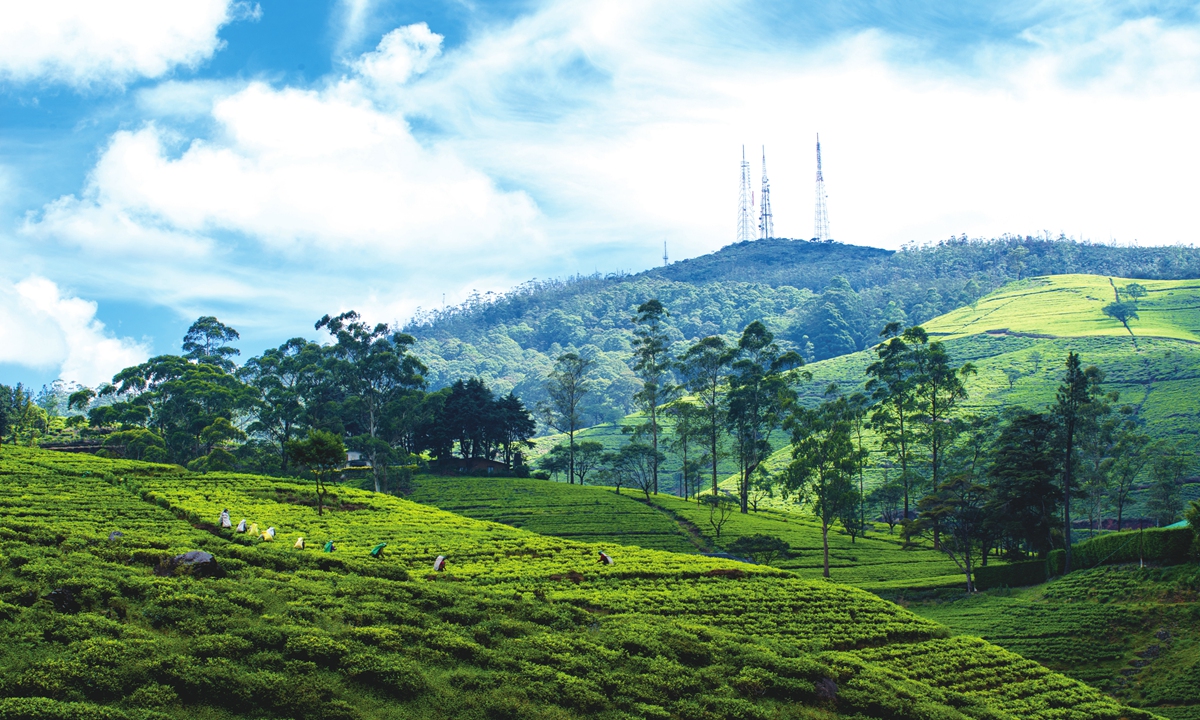

A Tea garden in Sri Lanka Photo: VCG
The Sri Lankan Ambassador to China, Palitha Kohona, brewed local black tea during a livestreaming session over the weekend, and before the fragrance of the tea had spread, nearly 200 bags of tea had been sold. During the live broadcast, a variety of Sri Lankan biscuits, Ceylon black tea and fruit tea on display were snapped up within seconds.
Kohona is among the diplomats from countries and regions along the Belt and Road Initiative (BRI) that have sold local specialties via livestreaming, one of the most innovative parts of China's digital economic strength that has created thousands of online sales stars in addition to drawing in foreign celebrities and influencers.
"Promoting Sri Lanka tea in this manner is a novel experience for me. However, I was very pleased with the feedback that I have received. I would recommend live streaming as a mechanism for marketing Sri Lanka's key products such as black tea, coconut products, rubber goods, garments etc," Kohona told the Global Times on Wednesday.
Prior to this livestreaming session, Kohona has also attended a livestreaming for the China International Import Expo which is viewed by over one million people.
Kohona, along with diplomats from Moldova, Indonesia, Italy and Pakistan, who attended a live-streaming event organized by China's Ministry of Foreign Affairs' International Charity Sale titled '"Love Knows No Borders" ' on Saturday.
The event has attracted millions of viewers with over 700,000 people pouring into the livestream room to comment and interact, over 200,000 orders were placed.
During the event Moldova's Ambassador to China, Dumitru Braghiș, sold out the 300 bottles of wine he had brought along with as soon as he took the stage; Gianpaolo Bruno, commissioner from the Italian Embassy in China, received hundreds of comments on the balsamic vinegar, olive oil, vegetable salad and wines he introduced.
Naeem Iqbal Cheema, counselor at the Embassy of Pakistan, introduced two well-known Pakistani specialties: Basmati rice, one of the premium rice types from the country and truck art products with unique and vibrant colors containing floral patterns, both of which were sold out within seconds.
"It was very encouraging to note that Pakistani products were very much liked by Chinese people," Naeem Iqbal Cheema told the Global Times on Thursday.

Palitha Kohona is introducing products. Photo: CNS photo
Rising consumption powerSince last year, many foreign ambassadors to China have made appearances in Chinese livestreaming rooms to promote products from their countries.
Many of them have been impressed with and quickly fallen in love with China's burgeoning livestreaming e-commerce sector, which has not only unlocked huge business potential amid the COVID-19 pandemic but also offered an innovative way to better understand the Chinese market.
In a time when global consumer spending has slowed down due to the pandemic with China's economy, the first to recover, the vibrant Chinese market has offered a silver lining to merchants from around the globe.
"In China, livestreaming has become immensely popular. In order for new products to be introduced to the Chinese market, it is important to rely on dynamic modern technologies such as livestreaming," Kohona said.
"China is the biggest consumer market in the world. It is also the most lucrative," he said. "It would not be difficult to sell more black tea and other products in the Chinese market with its 1.4 billion consumers," he said.
Naeem Iqbal Cheema also noted that the buying power of Chinese consumers has risen significantly over the past couple of decades owing to the remarkable growth of Chinese economy and miraculous achievement of the Chinese government to lift over 800 million people out of poverty.
"Domestic consumption is becoming an important pillar of China's future economic growth. This makes China a very attractive market for Pakistani consumer goods. We have seen that demand of Pakistani goods in China has gradually increased and we look forward to further enhancing our exports to China," he said.
According to data from the National Bureau of Statistics from January to November, national online retail sales reached 11.87 trillion yuan ($1.86 trillion), a year-on-year increase of 15.4 percent.

Naeem Iqbal Cheema and his wife are promoting Pakistani rice. Photo: CNS photo
Increasing export
Diplomats approached by the Global Times said they wanted to utilize the new channel to grow exports to China and share the opportunity brought by the country's rapid development.
Kohona said that Sri Lanka would like to access the Chinese market to a greater extent than is being done at present.
"The Embassy has been trying hard to introduce many products such as Sri Lankan fruits and vegetables, sea food and industrial products to the Chinese market. We would also like to see them in the voracious Chinese market place," he said.
"One of our goals is to eliminate poverty in our country as China has so successfully done. To achieve this goal, we should enable our farmers, fishermen and small industrialists to access the lucrative Chinese market," he added.
Naeem Iqbal Cheema said despite COVID-19 pandemic, this year our bilateral trade is expected to exceed $25 billion with Pakistan's exports to China likely to cross $3.54 billion.
"These are unprecedented figures which are likely to grow even more in the coming years," he said.
While demand and supply of some trading items particularly within industrial sectors will continue to be determined by the governments and major enterprises from both sides, e-commerce platforms help increase the cross-border flow of consumer products and more everyday items, Naeem Iqbal Cheema said, adding that Pakistan is interested to export its food items, dairy and livestock products and leather items, both raw and finished, to China.
"Therefore the live selling of consumer items would gradually increase the volume of bilateral trade between both sides," he said.
Bilateral trade between China and Pakistan, and exports from Pakistan to China, are both running at record levels for the year to date, Chinese Foreign Ministry spokesperson Wang Wenbin said at a press briefing on December 8.
China's trade with countries along the Belt and Road Initiatives totaled 5.35 trillion yuan ($839.95 billion) in the first half of the year. The growth rate is higher than the overall growth rate of China's foreign trade with the volume accounting for 29.6 percent of the total foreign trade, according to data from China's Ministry of Commerce.
The China-proposed Belt and Road Initiative (BRI) is a joint cause of all partners, and it is a development-driven, inclusive and green path that aims for mutual benefit, said Chinese State Councilor and Foreign Minister Wang Yi at the 2021 meeting of the Advisory Council of the Belt and Road Forum for International Cooperation (BRF) via video link on Friday.
He noted that China welcomes and holds open attitude to all cooperation proposals that will benefit each country's development, improve economic prosperity and living standards.
According to the data of the Ministry of Commerce, during the 13th Five Year Plan period 2016-20, China's imports contributed 34.9 percent to the growth of global imports.







